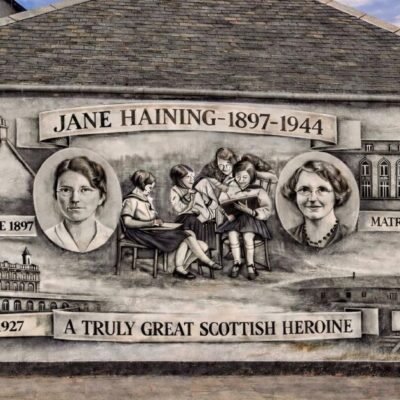
New artwork reveals hidden harms of digital ads
Adverts are watching us – or they could be soon. This is the message conveyed by Digital Dystopia, a new artwork to highlight the dangers of surveillance capitalism and ads deliberately designed to mislead.
Adblock Bristol, the founder member of the Adfree Cities network, organised an event at Sparks to showcase the artwork which is set to go on a national tour to highlight harmful advertising in our communities.
The organisation campaigns against intrusive corporate advertising in Bristol and has managed to block 150 digital ad screens – for example, those found on bus stops – including 40 giant screens, comparable to billboards or larger, since 2019.
Independent journalism
is needed now More than ever
Keep our city’s journalism independent. Become a supporter member today.
Speaking at the event on Wednesday Rob Bryher, councillor for St George West, said: “I can’t name a more effective lobbying organisation in Bristol. Adblock’s work is crucial.”

The mock ad screen presents flashing videos and images that demonstrate the harms done by big advertisers and indicates what people can do about it – photo: Ursula Billington
The eight Adblock groups under the Adfree Cities umbrella share a vision for urban spaces that prioritise community connection, public art and access to nature.
They are concerned that corporations are now placing hidden cameras in ad screens, though in planning applications it is stated the cameras are not currently turned on or will not be ‘without further conversations with the communities’ affected.
Adblock Bristol say that the cameras are able to recognise faces and calculate dwell time, potentially giving digital screens the same type of data harvesting capabilities as online adverts.
The ‘Digital Dystopia’ artwork is an anti-advertising unit made from re-engineered electronic waste that flashes images and videos revealing the deception used by major polluters to maintain their social licence to operate.

Adblock Bristol’s Robbie Gillett suggested fossil fuel companies use adverts to mislead the public, claiming ‘Big Oil’ often uses adverts to mask the fact it is downgrading its climate action – photo: Ursula Billington
Along with civil liberties issues, Adfree Cities is concerned fossil fuel companies could use the technology to support their interests to continue to delay the green transition, where they are already using greenwashed advertising to misinform and mislead the public around their investment in green technologies.
Adblock Bristol is campaigning for Bristol City Council to join Edinburgh and Sheffield councils in banning high-carbon ads – for example, those promoting flights, SUVs, or for oil companies like Shell – with Adfree Cities’ ultimate aim being to put enough pressure on the government for them to change national policy around harmful forms of advertising.
Chloe Naldrett, the Big Oil Arts Advertiser at Adfree Cities who created the artwork on display, said it’s time to ban ads for fossil fuel-based companies because: “Their massive profits are being made at the expense of our future.”

Adblock Bristol successfully protested a Shell advert that, they claimed, was misleading the public in Bristol about the balance of their green operations compared to their harmful ones. The advert was banned by the Advertising Standards Agency (ASA) in 2023 – photo: Rik Sims
“In their planning applications, multi-national corporations demonstrate they do not care about or understand local communities,” said Nicola Round of Adblock Bristol. She highlighted the huge amount of energy used to power digital ad screens – the equivalent of 11 UK households for giant screens or 3-4 households for the smaller ones.
Testimonies collected from residents affected by the giant screens above the M32 also highlight the harm to sleep, mental health, self-esteem, pride in place and wildlife these digital screens have caused.
Adblock Bristol fights applications for new screens by flagging them to communities who then send objections to their local councillors.
Rob Bryher sits on the council’s Development Control committee A. He urged the people in the room to keep fighting. “Objections work!” he said. “Always give your opinion – if this is something in your local area, object – it does make a difference.
“I went to the cinema the other day and saw more ads for cars than anything else…The insidious nature of the fossil fuel industry in our society is so hard to deal with.
“Advertising causes harm to our health. We have to get plans and processes in place that stop harm.”

Councillor Rob Bryher, who supports Adblock Bristol’s work, has a Masters in urban planning from UWE Bristol and previously campaigned for car free cities – photo: Ursula Billington
He stressed that the ban on high-carbon ads is on the council’s agenda, and is likely to come to committee for debate in two months time. The policy makes sense from a council perspective, he said, as high-carbon advertising undermines all of the council’s goals around making the city greener and emission-free.
Bryher also said digital ads are most commonly found in the centre and around Lawrence Hill, with more in the pipeline. He advised communities in those areas to support councillors to bring these planning applications to committee and ultimately stop the screens being built.
To present the alternative of a public space devoid of corporate advertising that prioritises nature and public art, Adblock Bristol started the Burg Arts project in 2018. Their community billboard on Mina Road in St Werburghs has featured murals celebrating nurses, nature, inclusivity and ‘shared love’.
The latest iteration shares the words ‘all I want for 2025 is dancing with all my friends’.

The Adblock billboard in St Werburgh’s shares positive, community-focused murals that serve to reflect and inspire local residents – photo: Martin Booth
Main image: Rik Sims
Read next:







No Comment! Be the first one.